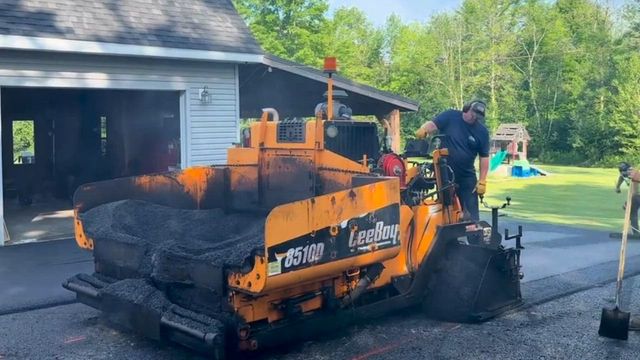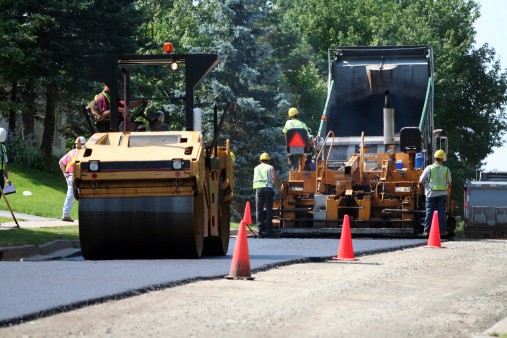Checking Out the Numerous Types of Asphalt Paving and Their Advantages
The landscape of asphalt paving includes a variety of kinds, each engineered to attend to specific demands and environmental considerations. From the durable qualities of Warm Mix Asphalt to the environment-friendly attributes of Recycled Asphalt Pavement, recognizing these options can significantly influence task outcomes. Technologies such as Warm Mix Asphalt and Porous Asphalt introduce added layers of efficiency and sustainability. As we explore these different paving options, the nuanced benefits they provide may stun you and potentially alter your technique to future paving tasks.
Warm Mix Asphalt
When considering the most effective paving services, hot mix asphalt (HMA) stands apart as a leading option for lots of applications (paving service). HMA is a functional leading product understood for its longevity, adaptability, and total efficiency. It is generated by home heating asphalt binder and incorporating it with accumulations at heats, making sure a consistent blend that can stand up to different environmental conditions
One of the key benefits of HMA is its capacity to supply a smooth, skid-resistant surface area, improving safety for vehicles and pedestrians alike. Additionally, HMA shows superb resistance to contortion, making it suitable for high-traffic areas such as highways and parking area. Its flexibility to various climates further adds to its extensive use.
The installation procedure of HMA is fairly quick, permitting effective job completion with marginal interruption to traffic. It can be reused, decreasing waste and advertising sustainability within the building industry. paving service. In general, warm mix asphalt stays a leading option for paving experts due to its durable performance features and long-term cost-effectiveness, making it a reliable option for various facilities needs
Warm Mix Asphalt
Cozy mix asphalt (WMA) provides a cutting-edge alternative to warm mix asphalt, providing comparable advantages while needing reduced production temperature levels. Typically created at temperature levels between 190 ° F and 250 ° F, WMA innovation reduces energy intake and greenhouse gas emissions during production, making it an extra environmentally pleasant alternative.
One of the crucial benefits of WMA is its extended workability duration. The lower temperatures enable more efficient transport and positioning, specifically in cooler weather conditions. This adaptability can lead to improved compaction and general toughness of the asphalt surface area. Additionally, WMA can be used in different applications, varying from highways to property driveways, without endangering efficiency.

The consolidation of additives or customized binders in WMA adds to its enhanced homes, making sure that it satisfies or surpasses performance standards. WMA's reduced thermal influence throughout production can decrease the chance of damages to the surrounding atmosphere, making it an appealing selection for lasting paving methods.
Cold Mix Asphalt
Cold mix asphalt is a functional paving option commonly made use of for short-term fixings and low-traffic areas. This kind of asphalt is produced at ambient temperatures, making it a hassle-free choice for quick solutions and tasks where conventional warm mix asphalt may not be viable. The mixture normally includes asphalt binder, aggregate, and additives, allowing it to stay workable for a prolonged duration.
Among the primary advantages of cool mix asphalt is its ease of application. It can be set up without customized equipment, making it easily accessible for smaller sized contractors and DIY fanatics. In addition, cold mix can be applied in different climate conditions, which is particularly beneficial for immediate fixing needs.

It may not provide the very same lasting sturdiness as hot mix asphalt, its fast application and flexibility make it an exceptional choice for temporary remedies and low-traffic applications. Generally, cold mix asphalt continues to be a functional choice in the asphalt paving landscape.
(see what’s next)
Porous Asphalt
Porous asphalt is a cutting-edge paving option created to enhance stormwater management and lower surface runoff. This here kind of asphalt includes a distinct structure that includes interconnected spaces, allowing water to penetrate with the surface area and right into the underlying layers. By helping with all-natural drain, porous asphalt aids reduce the risk of flooding and lessens the concern on municipal stormwater systems.
Among the primary advantages of porous asphalt is its capacity to enhance water quality. As stormwater filters with the pavement, contaminants and sediments are caught, decreasing the variety of contaminants that get in local rivers. This contributes to much healthier ecosystems and sustains compliance with environmental laws.
Furthermore, permeable asphalt can enhance the long life of the pavement itself. By minimizing water buildup on the surface, it decreases the potential for freeze-thaw cycles that can cause cracking and degeneration. The minimized demand for traditional stormwater administration framework can result in price savings for towns and programmers.
Recycled Asphalt Sidewalk
(discover more)Recycled asphalt sidewalk (RAP) represents a sustainable strategy to roadway building and upkeep that profits both the environment and the economic climate. By recycling existing asphalt products, RAP reduces the demand for brand-new raw products, which in turn conserves all-natural sources and decreases environmental impact. This method reduces power intake and greenhouse gas emissions associated with the production of new asphalt.
The consolidation of RAP right into brand-new sidewalk combinations can additionally lead to significant cost savings. Specialists can take advantage of recycled products to minimize total task expenditures, making it a financially viable option for municipalities and private developers alike. Additionally, RAP offers comparable performance characteristics to virgin asphalt, ensuring resilience and durability in road surfaces.
RAP's versatility permits it to be made use of in numerous applications, consisting of highways, parking area, and domestic driveways. By enhancing the architectural honesty of existing sidewalks, RAP contributes to improved safety and level of smoothness of roads.
Final Thought
Hot Mix Asphalt succeeds in sturdiness and quick setup for high-traffic locations, while Warm Mix Asphalt boosts sustainability via reduced power consumption. Cold Mix Asphalt offers as an economical choice for immediate repair services, Porous Asphalt properly handles stormwater, and Recycled Asphalt Pavement advertises environmental duty.